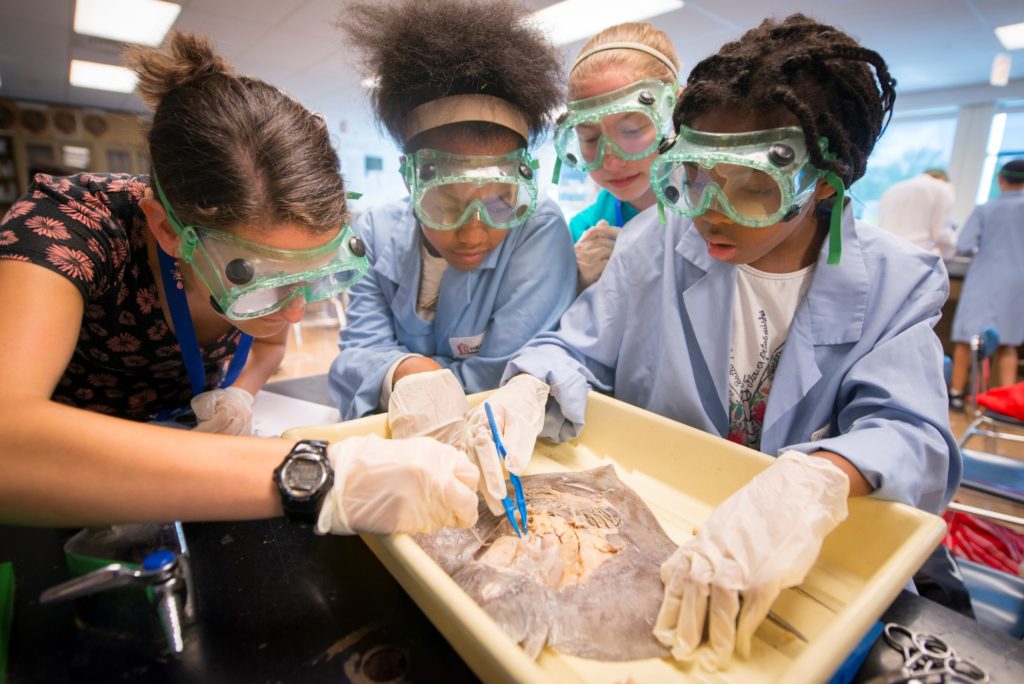How Teachers *Really* Spend Summer Break
It’s a common misconception that all teachers spend their summers sipping iced tea by the pool. In reality, many of your children’s educators are hard at work with students in summer programs or preparing for the new school year.
We caught up with a few members of the Rodel Teacher Council to learn about their summer projects.
—

Students present their racecar creations to parents and friends at Towne Point Elementary School’s culminating camp event.
Michele Johnson, a gifted and talented teacher and library media specialist at Towne Point Elementary School in Dover, had a busy summer. In addition to taking two courses and serving as a teacher leader in the Delaware Teacher Leader Pilot, Michele co-taught at her school’s project-based learning summer camp with colleague, Krista Seifert. Towne Point’s three enrichment camps included concentrations in gardening, engineering, and drumming for over 50 campers, and were provided free of charge by Capital School District.
Districts near and far are working to incorporate project-based learning opportunities during the summertime, as well as the regular school year. The projects give kids a practical, personal framework for thinking about their education. What better way to engage students than with an engineering camp about racecars?
Michele’s 10 students, ranging from first through fourth grade, spent the week designing racecars: making a plan, testing it, and heading back to the drawing board. A tour of Dover International Speedway was a highlight of the camp experience. She says, “Students who are engaged with something like this over the summer are able to get back into the school routine much faster.”
A summer camp is not the only way to keep your little ones thinking, though. Michele suggests giving your kids a budget at the grocery store, or letting them plan a day of your family trip. These fun ways to incorporate math and research will keep their minds active even on the hottest of days. For more summer activity ideas, check out Brandywine Buzz and DE Thrives.
—
Tim Brewer is preparing for a new role as an instructional technology coach at Hodgson Vocational High School. The high school, which is transitioning to a 1:1 technology program, is looking to Tim’s expertise to use technology effectively in the classroom.
Last month, Tim attended Schoology’s NEXT Conference in Florida, where he spent time learning about the changes to Schoology for the fall and ways to get teachers on board. He pointed out that there is great diversity of comfort with technology in the teaching profession, and called it both a blessing and a curse. Tim says the difference in confidence is most strikingly noticeable between millennials and those who consider themselves “digital immigrants.”
Through his new role, he plans to encourage these two groups to exchange ideas and learn from one another’s strengths. Using this year as a transition period, Tim hopes that teachers will develop confidence with the technology before the school goes 1:1 with devices next year.
In addition to all of his preparation for the coming year, Tim teaches a course at Wilmington University and participates in a weekly webinar on technology implementation and the Schoology platform. He says, “During the summer, a lot of teachers change hats and become students.” From his perspective, more teachers are engaging in some form of summer professional development than not.
—
Jen Hollstein, a high school English teacher at the Charter School of Wilmington, spent three weeks as a camp director with Smart Summer (formerly known as Cab Summer). The program combines science, math, and art to create a well-rounded program that attracts kids of all interests.
To help make the dream of a summer program that incorporated the strengths of Cab Calloway School of the Arts and the Charter School of Wilmington a reality, Jen joined forces with executive director Nan Stidham, who has been leading Cab Summer since 2010, and Cab Summer camp founder Carlos Alejandro.
The camps were designed for kindergarteners through eighth graders and included popular titles like Lego Camp, Charter Chef Camp, Spy Camp, and Marine Biology Camp. Smart Summer saw 339 children enroll in its inaugural summer programming. A $140,000 grant from the Longwood Foundation, to be used over the course of two years, has allowed Smart Summer to expand and give scholarships to many children who could not have attended camp otherwise.
Jen described the program as an opportunity for students to envision themselves as actual Cab and Charter students, experiencing learning in a new and exciting environment. For her, one of the greatest moments was walking into a classroom full of marine biology students who were enthusiastically holding up three-foot-long sharks they would soon dissect. Who knows—maybe the experience inspired a future career or two in marine biology.
These camps are the perfect cure for summer slide, the learning loss that occurs during students’ break from school. “Anytime you aren’t practicing a skill, you’re losing it,” Jen says. Whatever subject sparks their interest, it’s important for kids to keep a routine and continue learning all year round. The same goes for teachers: In addition to working with Smart Summer, Jen is working toward her Master of Instruction: Gifted and Talented degree.
—
Next time you imagine your child’s teacher binge-watching their favorite Netflix show for the entirety of July, think twice. These three educators provide just a few examples of the incredible work teachers are doing throughout the summer months.
